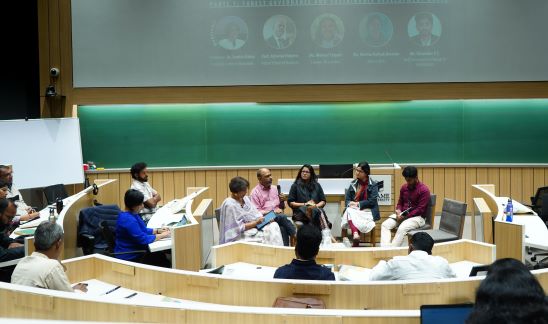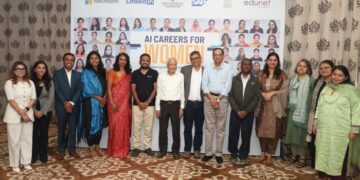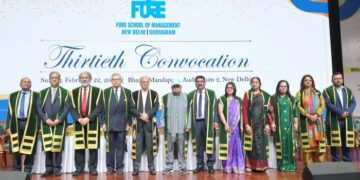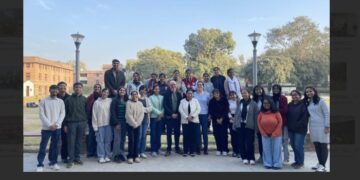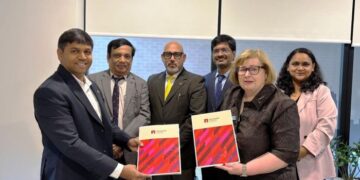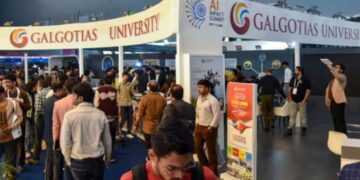FLAME University, in collaboration with the Indian Council of Social Science Research (ICSSR), recently hosted a national seminar on ‘Shaping the Future: Trends and Perspectives in Indian Biodiversity Conservation and Sustainable Development.’ The event stood as a platform for insightful and interdisciplinary conversations to protect India’s ecological wealth as well as safeguard local interests amidst climate change, socio-economic challenges, and rising urbanization.
The national seminar, inaugurated by Prof. M. A. Venkataramanan, Pro Vice-Chancellor, FLAME University, was sponsored by ICSSR. Prof. Abhineety Goel, Faculty of Environmental Studies, FLAME University; Prof. Chaitanya Ravi, Faculty of Public Policy, FLAME University; and Prof. Rajitha Venugopal, Faculty of Literary and Cultural Studies, FLAME University, organized this seminar with the intent to bring scholars, community practitioners, and NGOs to the same platform to have a substantive and meaningful dialogue.
Prof. Dishan Kamdar, Vice-Chancellor of FLAME University, highlighted the importance of a collaborative community approach in addressing India’s sustainability and conservation challenges. He shared, “A collective approach that synchronizes the efforts of policymakers, industry, academic institutions, and the larger society will help in addressing this problem effectively. We need a multi-pronged plan that emphasizes outcome-based actions to deliver real results. At FLAME, we are committed to sensitizing and preparing our community and students to be more conscious and responsible by engaging them in thought-provoking interactions and practices that will enable them to promote conservation and sustainable development in harmony with economic development and our ecological heritage.”
Dr. Nitin Rai, an independent researcher, was the keynote speaker who highlighted the denial of land rights to adivasis in this context. He said, “Denial of land rights and land ownership has resulted in the alienation of adivasis and has removed their participation from institutions of forest governance. They are now only being treated as beneficiaries, while in the past, they were the owners.” He further added, “Protected areas are now working as a justification to dilute environmental laws because of the presumed success of tiger conservation. The Forest Rights Act provides an opportunity to devolve power to govern forests to gram sabhas.”
The seminar was structured into three engaging panel discussions. The first panel discussion focused on Forest Governance and SDGs. This discussion saw the participation of Prof. Ashwini Chhatre, Associate Professor, Economics & Public Policy and Executive Director, Bharti Institute of Public Policy, Indian School of Business; Ms. Meenal Tatpati, Research and Policy Associate, Women4Biodiversity; Ms. Neema Pathak Broome, Coordinator, Conservation and Livelihoods Programme, Kalpavriksh and Regional Coordinator, ICCA Consortium (South Asia); and Mr. Viswadev V.S, Senior Project Officer, BAIF Development Research Foundation. During the panel, Prof. Ashwini Chhatre stated, “Security of tenure for local communities accompanied by authority, discretion, and resources to manage natural resources is the best possible way to align forest conservation efforts with sustainability goals.”
This was followed by the second panel discussion on Wildlife Conservation and Management. The panelists for this discussion included Mr. Jayant Kulkarni, Director, Wildlife Research & Conservation Society; Prof. Ajit Menon, Professor, Madras Institute of Development Studies; Dr. Pankaj Sekhsaria, Associate Professor, Centre for Technology Alternatives for Rural Areas (CTARA), IIT-Bombay; Mr. Arnab Bose, Independent Practitioner; and Dr. Ghazala Shahabuddin, Visiting Professor, Environmental Studies Department, Ashoka University. Speaking on this panel, Mr. Jayant Kulkarni emphasized, “Protected areas cannot protect the entire range of wildlife. There is a need to look at the larger landscape outside protected areas for wildlife conservation and management.”
The third panel discussion focused on Indigenous Systems and Practices. This panel witnessed the participation of Dr. Asmita Kabra, Associate Researcher, Centre de Sciences Humaines (CSH); Dr. Venkat Ramanujam, Assistant Professor, Shiv Nadar University; Mr. Subhash Dolas, Bhimashankar Wildlife Sanctuary; and Mr. Faisal Rehman and Mr. Mountheesh Kuttan from Keystone Foundation. Speaking on Indigenous Knowledge Systems, Mr. Faisal Rehman remarked, “The bio-cultural standpoints of Indigenous-Adivasi communities are not just a cultural asset but a functional tool for modern conservation policies. We must prioritize its integration into national and local governance frameworks.”
Also, sharing her valuable insights on Indigenous Systems and Practices was Dr. Asmita Kabra, who shared, “Contemporary conservation science and protected area management rely heavily on local knowledge held by community members for effective management of national parks, wildlife sanctuaries, and tiger reserves. However, this local knowledge is hardly ever acknowledged formally. Adivasi communities and other forest dwellers are merely used as underpaid labor for tracking wildlife, managing grasslands, assisting in invasive species management, running forest chowkis, managing fire, and in many other routine conservation activities that are crucial for the survival of wildlife. Just imagine how much better conservation outcomes could be obtained if they were equal stakeholders rather than just wage workers for biodiverse landscapes.”
The seminar concluded with impactful recommendations, emphasizing the need to strengthen policy frameworks, foster community engagement, and enhance collaboration between academia, civil society, and government institutions to drive meaningful change in Indian biodiversity conservation. Post the seminar, the organizers will publish articles and white papers to generate actionable insights and provide evidence-based policy recommendations derived from the panel discussions held at the seminar.


